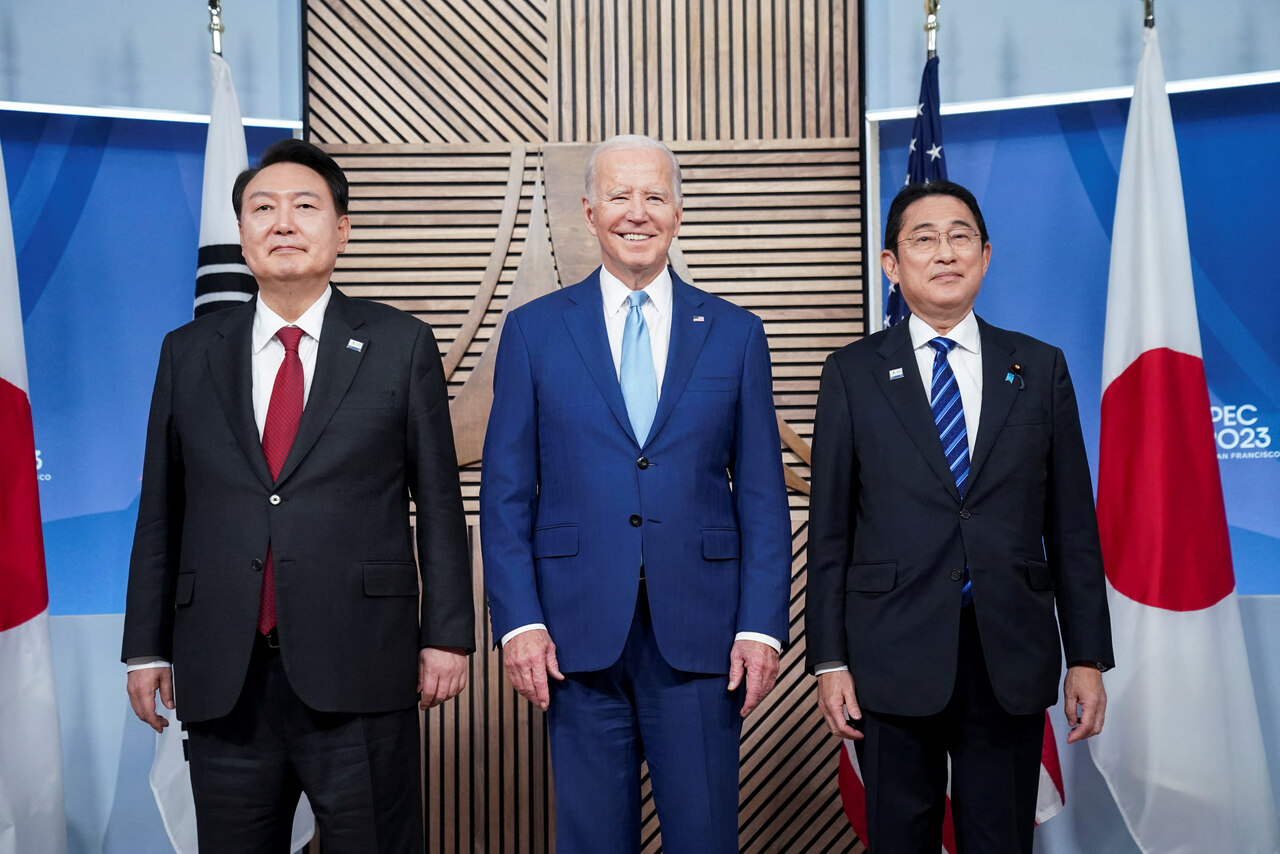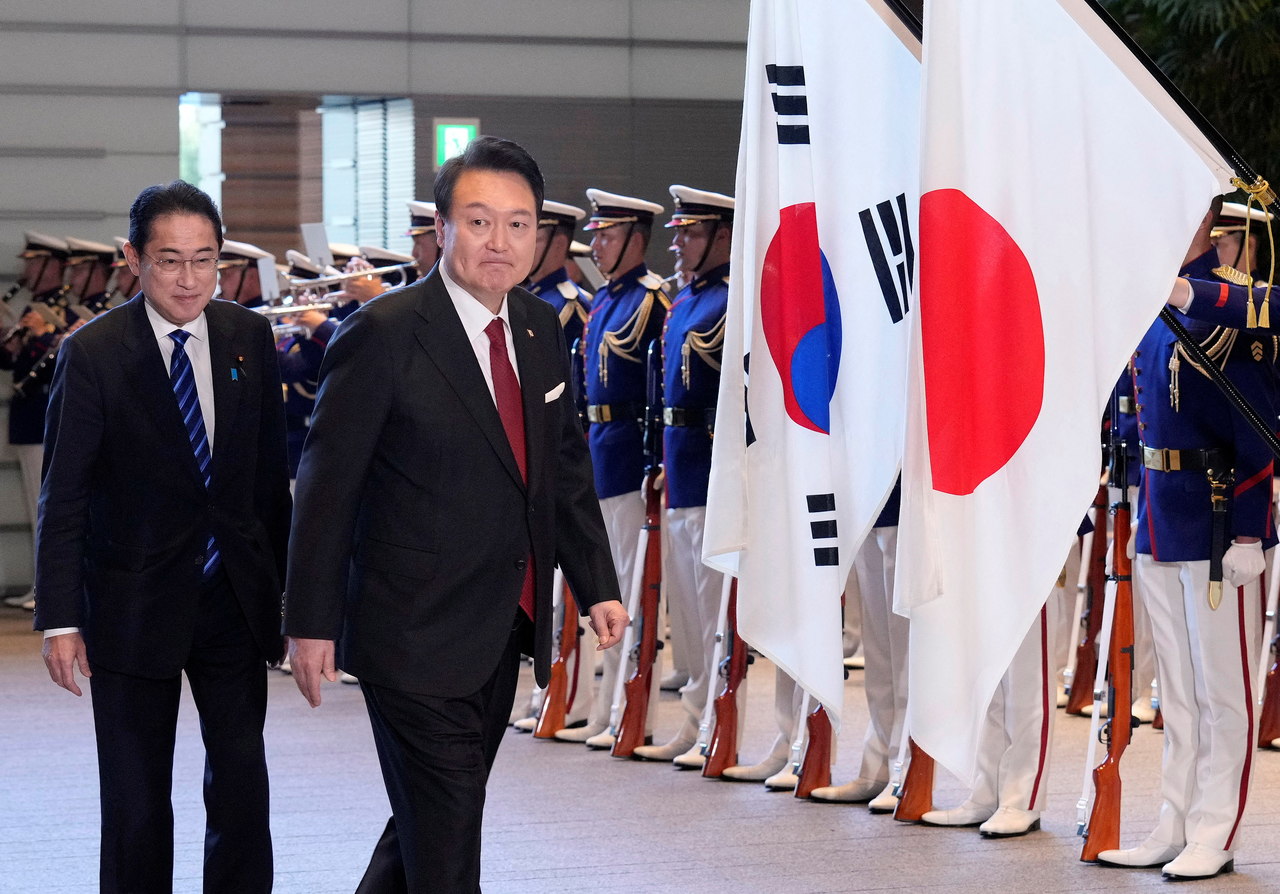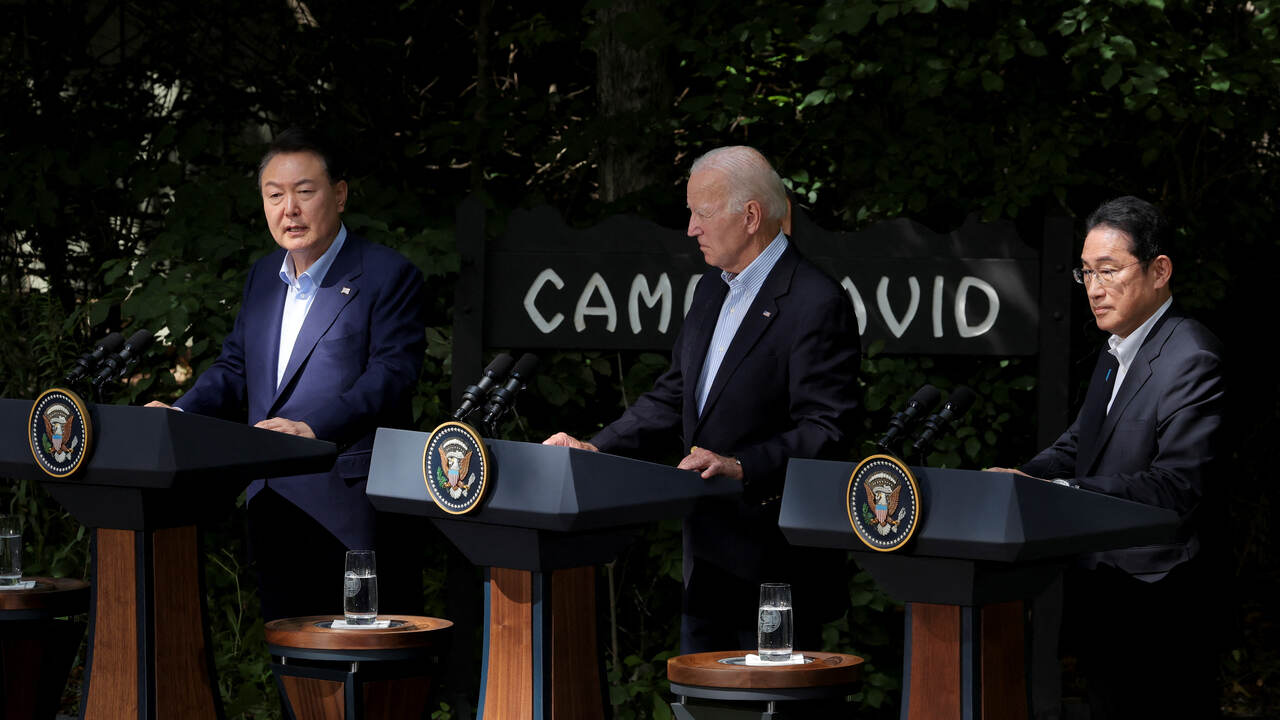A Scalene Triangle: U.S.-Japan-South Korea Cooperation Heralds Opportunities Amidst Constraints
The U.S., Japan, and South Korea are seeking to deepen trilateral cooperation in response to challenges and threats from North Korea and China. This cooperation was demonstrated at the summit of the leaders of the three countries at Camp David in August. The most severe constraint on cooperation between them in the years ahead may be internal changes and the high degree of economic ties between Japan, South Korea, and China. The mobilisation of allies by the U.S. in its rivalry with China could also lead to an intensification of tensions in East Asia.
 KEVIN LAMARQUE / Reuters / Forum
KEVIN LAMARQUE / Reuters / Forum
The Nature of Cooperation between the Three to Date
Since the 1950s, Japan and the South Korea have been key U.S. treaty allies in East Asia. Despite U.S. efforts, trilateral collaboration during the Cold War was limited due to, among other things, problems settling Japan’s relations with South Korea after the Japanese occupation of Korea from 1910 to 1945. Trilateral cooperation intensified from the 1990s onwards because of the development of North Korea’s nuclear and missile programmes. At that time, the U.S., Japan, and South Korea set up consultation mechanisms at the level of vice ministers (secretary) of defence and foreign affairs, organised joint military exercises, and exchanged intelligence. The political keystone of cooperation was the series of meetings of the three leaders on the margins of multilateral forums and held regularly since 1994.
However, South Korea’s disputes with Japan have regularly constrained this trilateral cooperation. Their 2017-2022 spat led to the suspension of most tripartite mechanisms. The Biden administration since its first days not only has sought to strengthen U.S. bilateral ties with Japan and South Korea but also has attempted to ease tensions between them. The change of power in South Korea in 2022 and the adoption by President Yoon Suk-yeol’s conservative administration of a conciliatory stance towards Japan paved the way for the U.S. to intensify cooperation with its Asian allies and host a meeting of the three leaders at Camp David in August this year.
Opportunities
Increased cooperation between the U.S., Japan, and South Korea is facilitated by their shared commitment to a vision of a free and open Indo-Pacific, based on respect for international law and opposition to unilateral attempts to change the status quo by force or coercion. At Camp David, the leaders pointed to China’s activities, including its attempts to illegally subjugate states in the South China Sea, as an example of actions that undermine regional peace and prosperity. Signalling opposition to the Chinese actions, they stressed the need for a peaceful resolution of disputes in the Taiwan Strait, the stability of which, in the leaders’ view, is vital to global security and the economy.
Effective coordination between the three countries is to be achieved through new mechanisms for regular consultations at various levels. At Camp David, the parties agreed that trilateral meetings of leaders, foreign and defence ministers (secretaries) and national security advisers will occur at least once a year. Establishing a format for annual consultations between the ministers (secretaries) of finance, trade, and industry is expected to improve economic cooperation. Coordinated implementation of the Indo-Pacific strategies of the three countries and the development of new areas of regional cooperation is to be facilitated by the Trilateral Indo-Pacific Dialogue. Notably, simply strengthening consultation and coordination mechanisms is not equivalent to creating a trilateral alliance. Treaty provisions of U.S.-Japan and U.S.-South Korea alliances remain paramount to the Camp David political commitments.
Responding to threats from North Korea remains an essential manifestation of cooperation between the U.S., Japan, and South Korea. Politically, the parties maintain the goal of denuclearising North Korea and call on all UN members to implement sanctions on the country. They jointly criticise North Korea’s increased cooperation with Russia, including the supply of military equipment for Russian aggression against Ukraine. The U.S., Japan, and South Korea are also developing defence cooperation by organising joint drills focused primarily on detecting and responding to missile threats from North Korea. October saw the first-ever trilateral air force exercises involving fighters from the three countries and a B-52 bomber capable of carrying nuclear weapons. In November, the partners also established a consultative group on cyberthreats from North Korea.
The three countries also intend to develop cooperation on economic security, technology, and climate change, including through the Trilateral Economic Security Dialogue established last year. The catalogue of topics coincides with decisions reached bilaterally by the U.S. with Japan and South Korea in previous years. The parties emphasise increasing the resilience of supply chains and developing technology standards, energy security, biotechnology, and artificial intelligence. In November, the first consultation on space security also took place.
Constraints
The U.S., Japan, and South Korea declare their desire to deepen political, military, and economic ties. However, initiatives to boost trade cooperation are insufficient. The U.S. proposal of the IPEF, which includes Japan and South Korea, remains vague. The high degree of economic ties with China is prompting Japan and South Korea to return to trilateral talks with China on trade issues. The pragmatism of these countries is also evidenced by their membership in the world’s largest free trade area, the RCEP, in which China, but not the U.S., participates. The U.S. and South Korea’s lack of participation in the CPTPP, of which only Japan is a part, also does not facilitate better coordination.
Historical experience shows that internal changes in the three countries can hamper their cooperation. Despite improvements in bilateral relations, most of the South Korean public still does not have a favourable opinion of Japan. In addition to historical disputes, Koreans have been protesting the release of radioactive water from the Fukushima power plant into the ocean, which began in August this year, while the Korea-Japan territorial dispute over the Liancourt Rocks (Dokdo in Korean/Takeshima in Japanese), a group of islets, remains unresolved. The liberal opposition in South Korea, which has a majority in parliament, criticises not only the president’s conciliatory policy towards Japan but also his approach towards China, which is more confrontational than previous administrations. In next year’s parliamentary elections, the opposition may strengthen its position ahead of the 2027 presidential election. In Japan, on the other hand, support for the government of Prime Minister Kishida Fumio, who is personally committed to improving relations with South Korea, is at its lowest (below 30%) since the beginning of his government in 2021. The possible replacement of the current prime minister by another Liberal Democratic Party politician could reduce Japan’s willingness to cooperate with South Korea. Also, the election of an isolationist U.S. president in November 2024, such as Donald Trump, could disrupt cooperation with East Asian allies.
Conclusions and Perspectives
The U.S. is mobilising allies in its rivalry with China by increasing cooperation with Japan and South Korea. The Biden administration has used the favourable moment of Japanese-South Korean rapprochement to intensify trilateral cooperation. It should be seen as another manifestation, after AUKUS and others, of the U.S. vision of a free and open Indo-Pacific, a pillar of which is strengthening U.S. cooperation with its allies. The strengthening of the trilateral political dialogue also serves to consolidate Japan’s rapprochement with South Korea.
However, the long-term success of the three countries’ cooperation will depend on internal changes. The current rapprochement is only possible with the conciliatory attitude of the Yoon administration towards Japan and the alignment of South Korea’s foreign policy with U.S. expectations. However, this orientation is not standard in South Korea, and its foreign policy may determine the shape of trilateral cooperation in the years to come. An opposition takeover in 2027 could mean a South Korean move away from dialogue with Japan and withdrawal from the trilateral format in its current form.
The deepening of U.S. cooperation with Japan and South Korea, although described by these countries as a stabilising factor, may exacerbate regional tensions. China, North Korea, and Russia may increase the intensity of military action in response to the joint U.S.-Japan-South Korea manoeuvres. The reaction may include an intensification of Chinese exercises in the Taiwan Strait and East China Sea, an expansion of the scale of Sino-Russian naval and air manoeuvres, and a greater frequency of North Korean missile tests. Given the growing interdependence of the situation in Europe and Asia, Poland may expand its dialogue with Japan and South Korea to include an exchange of experience in cooperating with the U.S. and responding to threats from Russia, China, and North Korea.



.jpg)

